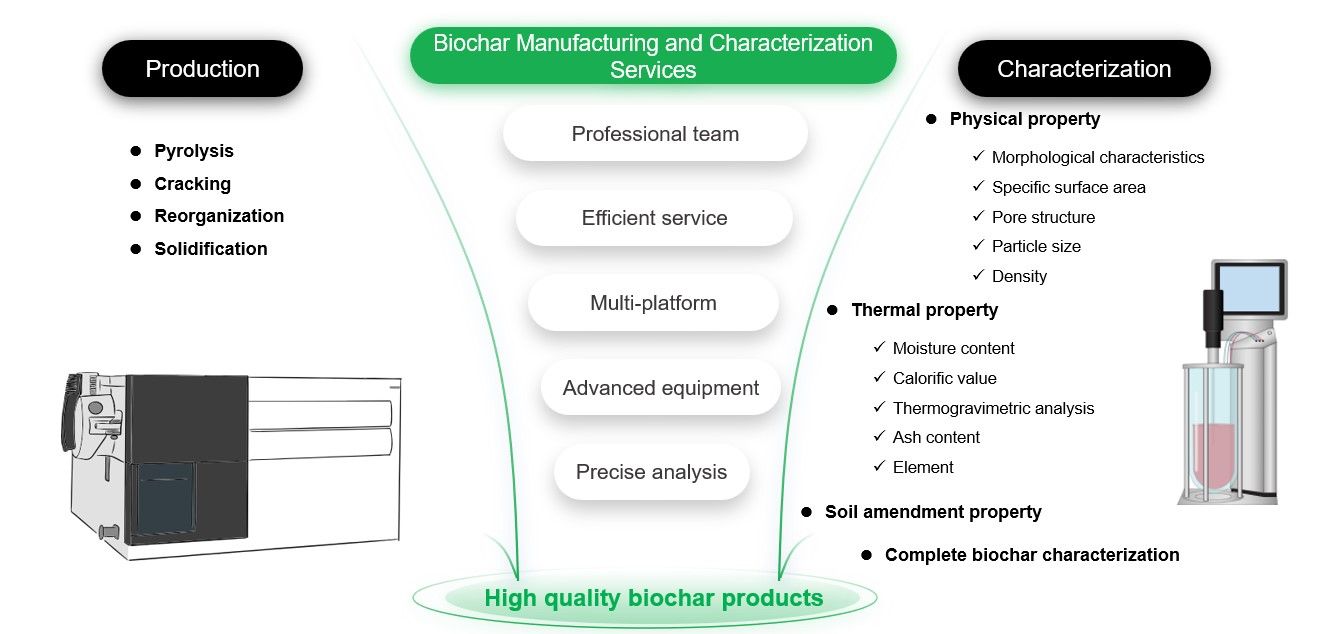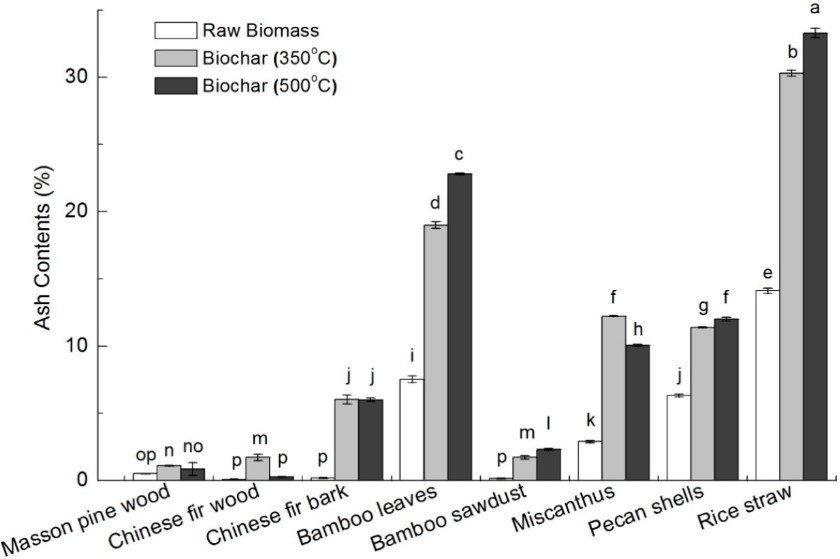Biochar Manufacturing and Characterization Services
Welcome to Contact Creative Biolabs to Customize Your Biochar Production and Analysis Services
Biochar is a carbonaceous product made by pyrolysis or gasification of biomass materials under anoxic or hypoxic conditions. Its formation process is divided into the following four stages:
-
Pyrolysis: Biomass materials undergo pyrolysis reactions at high temperatures, and the water and volatile organic matter in them are released to produce tar and gas.
-
Cracking: With increasing temperature, large molecular organic compounds in biomass begin to crack, producing unstable intermediate products.
-
Reorganization: Under high-temperature conditions, the cracking products begin to rearrange and reorganize to form a stable carbon structure.
-
Solidification: The carbon structure is then further stabilized to form biochar with a porous structure and a large specific surface area.
The formation of biochar is a complex process. Understanding its formation process helps to optimize the production process and produce biochar products with excellent properties and functions for applications such as soil improvement, carbon sequestration, and environmental remediation. Creative Biolabs has comprehensive production and analysis equipment, and our experienced technical team provides clients with full-process services from biochar production to characterization.
We select suitable biomass raw materials (such as wood, and straw), perform pyrolysis treatment, and convert them into biochar. Throughout the biochar production process, we control and optimize key parameters such as temperature, heating rate, and gas content. These parameters affect the final properties of biochar, such as pore structure, specific surface area, stability, and adsorption capacity. In addition, the type of biomass will also affect the characteristics of the final product, and biochar made from different raw materials may have different properties.
-
Characterization of biochar
The biochar physical property analysis services we provide mainly include morphological characteristics, specific surface area, pore structure, particle size, and density. These analyses help evaluate the adsorption performance, stability, and pore structure characteristics of biochar, which provide a scientific basis for its use in soil improvement, energy applications, and other fields.
For biochar, we perform a variety of thermal property analysis services, including moisture content, calorific value, thermogravimetric analysis, ash content, and various elemental analyses. These analyses are implemented through thermogravimetric analysis (TGA), calorimeters, chromatography, mass spectrometry, and other technologies. Thermal property analysis helps to comprehensively evaluate the behavior of biochar under high-temperature conditions, combustion characteristics, and its potential effects in thermal applications, providing an important reference for its industrial applications and environmental impacts.
We provide a variety of analyses for the properties of biochar in soil improvement, including soil physical and chemical property testing (such as pH, conductivity, and organic matter content), water retention capacity determination, nutrient adsorption/release performance analysis, etc. Through these analyses, we help clients comprehensively evaluate the impact of biochar on soil, including its role in improving soil structure, increasing soil fertility, promoting plant growth, and reducing environmental pollution, which provides scientific guidance for the rational use of biochar for soil improvement.
Complete characterization of biochar requires a variety of analytical services, including physical properties (such as specific surface area, density, etc.), chemical properties (such as elemental composition, organic matter composition, etc.), thermal properties (such as thermal stability, pyrolysis characteristics, etc.), structure and functional analysis (such as soil improvement effect). We provide complete comprehensive analysis for biochar to help clients fully understand the properties of biochar, and to help clients better understand the potential application value and environmental effects of biochar.

Creative Biolabs takes client satisfaction as its core. We actively listen to client needs and provide clients with high-quality biochar production and characterization services to support clients' various project needs. Please contact us if you need to learn more about our services, our staff will respond to your needs promptly.
Published data
Waste residues from agriculture and forestry are used as a sustainable source for the production of biochar. The authors used eight common waste biomass as raw materials, produced biochar by pyrolysis carbonization, and evaluated various properties of biochar. Various biomass raw materials were dried and crushed in advance, then placed in a reactor, slowly heated under inert gas conditions, maintained at a peak temperature of 500 °C for a while, and then cooled to obtain biochar samples. The authors then ground, sieved, and characterized the biochar samples from various sources. The results in the figure below showed that the ash content of biochar produced by different biomass varies greatly, and the ash content in the raw materials affected the ash content of the final prepared biochar. Among them, rice straw had the highest ash content, up to 14%, while Chinese fir wood had the lowest ash content, at 0.08%. In addition, pyrolysis temperature affected the content of fixed carbon and volatile matter in biochar samples. This study showed that carbonizing appropriate residues by pyrolysis was a feasible technology that helped to increase the value of biomass raw materials.
 Fig.1 Ash content of biomass and biochar samples.1, 2
Fig.1 Ash content of biomass and biochar samples.1, 2
FAQs
Q1: What is the best use of biochar?
A1: Biochar is used in soil improvement, environmental governance, water treatment, and many other fields. We will provide corresponding production and analytical support according to client needs.
Q2: Can your biochar products be customized?
A2: Yes, we customize biochar products according to client needs, and adjust the production process and formula to meet specific requirements.
Q3: How to ensure the durability and stability of biochar products?
A3: We will take corresponding measures during the manufacturing process to ensure the durability and stability of biochar products, and also provide relevant analytical data support.
Customer Review
Provide Custom Biochar Products
"Thanks to Creative Biolabs for customizing our biochar products. Their careful control over raw material selection and production process has resulted in excellent product performance. I highly recommend their services!"
The Biochar Samples Produced Have Achieved High Client Satisfaction
"The quality and performance of the biochar products are competitive in the market. We are satisfied with the production and analysis services provided by Creative Biolabs. We wish to establish a long-term cooperative relationship with them!"
References
-
Yang, Xing, et al. "Thermal properties of biochars derived from waste biomass generated by agricultural and forestry sectors." Energies 10.4 (2017): 469.
-
Under Open Access license CC BY 4.0, without modification.
For Research Use Only.
Related Services


 Fig.1 Ash content of biomass and biochar samples.1, 2
Fig.1 Ash content of biomass and biochar samples.1, 2

